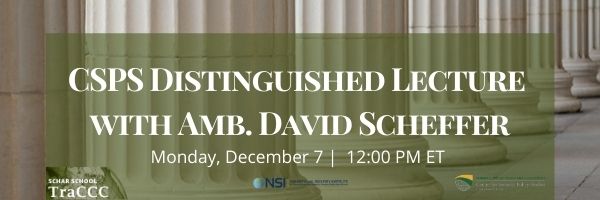
Thanks for joining us for a conversation with Amb. David Scheffer, the State Department’s first Ambassador-at-Large for War Crimes Issues, as he discussed the International Criminal Court, from the Court’s history to its more recent controversies. This event took place Monday, December 7 at 12:00 PM ET.
Featured:
- Amb. David Scheffer, former Ambassador-at-Large for War Crimes Issues and Professor, University of Chicago Law School;
- Jamil N. Jaffer, Founder and Executive Director, National Security Institute
- Dr. Louise Shelley, Founder and Executive Director, Terrorism Transnational Crime and Corruption Center
- Ellen Laipson, Director of the Center for Security Policy Studies (moderator)
Speaker Bios:

David J. Scheffer is visiting senior fellow at the Council on Foreign Relations (CFR), with a focus on international law and international criminal justice. Scheffer is also the Tom A. Bernstein Genocide Prevention Fellow working with the Ferencz International Justice Initiative at the Simon-Skjodt Center for the Prevention of Genocide, U.S. Holocaust Memorial Museum, as well as Clinical Professor Emeritus and Director Emeritus of the Center for International Human Rights at Northwestern Pritzker School of Law in Chicago. From 2012 to 2018 he was the U.N. Secretary-General’s Special Expert on U.N. Assistance to the Khmer Rouge Trials. He is Vice-President of the American Society of International Law.

Jamil N. Jaffer is the Founder and Executive Director of the National Security Institute, and an Assistant Professor of Law and Director of the National Security Law & Policy Program at the Antonin Scalia Law School at George Mason University. Jamil is also Senior Vice President for Strategy, Partnerships & Corporate Development at IronNet Cybersecurity, a technology products startup founded by Gen (ret.) Keith B. Alexander, the former Director of the National Security Agency and Founding Commander of U.S. Cyber Command. In addition, Jamil is an advisor to Beacon Global Strategies, a strategic advisory firm; 4iQ, a deep and dark web intelligence startup; Duco, a technology platform startup that connects corporations with geopolitical and international business experts; and Amber, a digital authentication and verification startup.

Dr. Louise Shelley is the Omer L. and Nancy Hirst Endowed Chair and a University Professor at George Mason University. She is in the Schar School of Policy and Government and directs the Terrorism, Transnational Crime and Corruption Center (TraCCC) that she founded. She is a leading expert on the relationship among terrorism, organized crime and corruption as well as human trafficking, transnational crime and terrorism with a particular focus on the former Soviet Union. She also specializes in illicit financial flows and money laundering. She was an inaugural Andrew Carnegie Fellow. Her newest book written while on the Carnegie Corporation and Rockefeller Foundation Bellagio Fellowship, Dark Commerce: How a New Illicit Economy is Threatening our Future, on illicit trade, the new technology and sustainability was published with Princeton University Press in November 2018.

Ellen Laipson is the Director of the Center for Security Policy Studies at the Schar School of Policy and Government at George Mason University. Professor Laipson joins George Mason University after a distinguished 25 year career in government and as President and CEO of the Stimson Center (2002-2015). Ellen Laipson serves on a number of academic and other non-governmental boards related to international security and diplomacy, and is a columnist for worldpoliticsreview.com. Her last post in government was Vice Chair of the National Intelligence Council (1997-2002). Laipson also served on the State Department’s policy planning staff, the National Security Council staff, and the Congressional Research Service. A member of the Council on Foreign Relations, she serves on the Advisory Councils of the Chicago Council on Global Affairs and Georgetown University’s Institute for the Study of Diplomacy.
